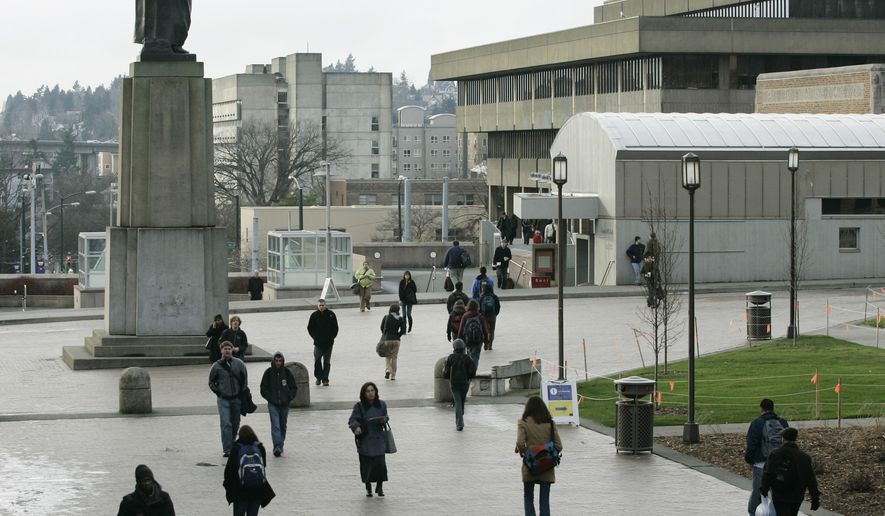University of Washington atmospheric scientist Cliff Mass has been called plenty of names, including climate “denier,” but it wasn’t until he came out against the state’s proposed carbon tax last month that he was accused of being a racist.
Since then, Mr. Mass said he has been upbraided by the university’s diversity dean and subjected to a faculty “inquisition,” events that have stoked alarm about the threat posed by campus climate-change activism to academic freedom.
“I’m really worried about the intolerance that has developed at the university,” Mr. Mass told The Washington Times. “It’s really a minority of graduate students and just one or two faculty that are the real activists. I don’t want to make it seem like everybody’s like this, they’re not. But it’s poisoning the place, the fact that you’ve got to watch your step here.”
The hubbub began when he ran on his blog an Oct. 14 post against Washington State Initiative 1631, arguing that the proposed carbon tax would funnel millions to special interests, including labor, tribal governments and social-justice groups, which he illustrated with a photo of pigs at a trough.
Supporters of the measure, which went down to defeat Nov. 6, decried the post as racist. Mr. Mass “compared Native tribes, communities of color, and unions to pigs for advocating for public investments in their communities,” as UW lecturer Alex Lenferna put it in a Medium op-ed.
“It’s a disturbing, callous and arguably racist analogy, which fails to recognize how these communities are so often overlooked and underfunded in Washington,” said Mr. Lenferna, who included a photo of Mr. Mass with a heart and an oil can.
Mr. Mass countered that the image represented a standard reference to pork-barrel politics, and later removed the photo, but the post soon ran afoul of the College of the Environment’s Office of Diversity, Equity and Inclusion.
“There were a few activists in the department, a few students who had been upset with me for a while, and they really ran with it,” Mr. Mass said. “They went to the diversity dean of the college, and instead of talking to me about it, what he did is he sent a message out to the whole department, saying ’this unfortunate blog and racist imagery’ to everybody. So that went really hot.”
Last week, Dale Durran, chairman of the atmospheric sciences department, held a department-wide meeting to discuss the issue, which did not go well for Mr. Mass.
“So he invited everybody to talk about it — with food, too — and it basically was an inquisition, just an hour of me being attacked,” Mr. Mass said. “And when I tried to talk about incivility, which was the topic, he was screaming. He wouldn’t let me talk. So it was just an absolute disaster.”
Mr. Durran and the university media office did not return immediately requests for comment Thursday. During the campaign, Mr. Durran championed the carbon tax in an Oct. 29 letter to the Seattle Times signed by 22 faculty.
The situation has since drawn the attention of the national climate science community, kicked off by Georgia Tech professor emeritus Judith Curry, who wrote a lengthy post Wednesday on her Climate Etc. blog, titled “Cliff Mass: victim of academic political bullying.”
“The public ’shaming’ meeting is beyond the pale, particularly the Chair’s behavior during this meeting,” said Ms. Curry, who said she spoke with Mr. Mass and two other faculty. “After this behavior, I cannot imagine how the UW faculty and administration can have any confidence in the leadership of their current Chair.”
She argued that Mr. Mass is far from a climate denier — “he accepts the consensus viewpoint” — but that activists have labeled him as such for his pushback against blaming wildfires and other “extreme weather events” on global warming.
“I’m pretty mainstream, but I have talked about this attribution of every extreme weather event and climate change. I’ve tried to counter some of that,” Mr. Mass said. “I’ve written papers and been blogging about the fact that the wildfires in California are not due to climate change. They’re due to other reasons. And that’s not welcome in certain communities.”
He and others have argued that I-1631 would have actually hurt disadvantaged communities by raising energy prices. The measure, the third failed attempt to pass a state carbon tax, lost by 57 to 43 percent.
Will he face discipline? A tenured professor who joined the UW faculty in 1981, Mr. Mass said he has heard nothing since the Dec. 4 departmental meeting, but he fears more for the university than he does for his job.
“There’s an intolerance there. There’s an idea that diversity of ideas and viewpoints isn’t something that’s valued so much,” Mr. Mass said. “At this point, what I’m hoping is that the fact that this kind of blew up on them, that maybe people are going to be a little bit more careful about this stuff.”
• Valerie Richardson can be reached at vrichardson@washingtontimes.com.




Please read our comment policy before commenting.